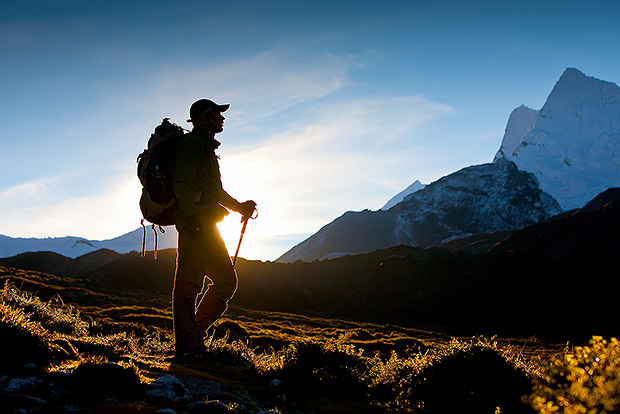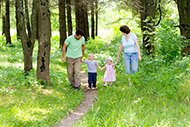
Combining the physical and mental benefits of a day hike with controlled calorie intake can make hiking an effective tool in your weight loss plan. Discover why hiking can help you lose weight and apply these tips to enhance the benefits.
The Benefit of Lower Intensity, Longer Duration Exercise
Fitness professionals once believed low to moderate-intensity exercise was the most effective for weight loss due to the body’s reliance on fat for energy, often called the fat-burning zone. However, current research suggests total calories burned is more important. When done for the same duration, more calories are burned during high-intensity activities versus low-intensity activities.
The long duration of hiking makes it effective for weight loss. The low intensity allows you to hike for hours, potentially blasting 1000+ calories (480 calories per hour for a 150-pound female). Lower intensity and longer duration activities may also improve blood cholesterol levels and insulin function. A Dutch study found that when the same number of calories are burned, low-intensity activity done throughout the day may be more effective than short, intense activity at improving blood cholesterol and insulin levels.
The Impact of Nature on Health Behaviors
Research indicates that exercising in nature can reduce depression and boost self-esteem. If weight loss is your objective, these benefits not only provide the mental fortitude to adhere to your plan but also influence your behaviors. Daily, we are bombarded with triggers that prompt emotional eating, such as stressful encounters or food commercials on television. Stepping away from your current environment can aid in recognizing and managing these triggers. The focus and mindfulness gained during a hike can be applied upon your return to further control emotional eating.
Watch Out for Energy Dense Snacks
Adults weighing 150 to 200 pounds can burn 1,900 to 2,500 calories on a four-hour hike. The problem is that this high level of calorie burn often results in increased hunger to refuel hardworking muscles. For this reason, typical hiking snacks like energy bars and trail mix are packed with calories. They can help you replenish energy without carrying large amounts of food. If you want to lose weight, it’s important not to eat back all the calories you’ve worked so hard to burn. Focus on a combination of snacks that supply complex carbohydrates, protein, fiber, and healthy fat that will keep you full with fewer calories. Jerky, dry cereal, vegetables with hummus, fruit with nut butter, and string cheese sticks are good choices that will stay fresh in a small insulated lunch bag for day hikes.
Try Adding Extra Gear
Hiking with a pack requires you to work harder, resulting in an increase in calories burned. A 150-pound person hiking with a 21-42-pound pack burns about 80 more calories per hour than when hiking without a pack. Trekking poles may also be an effective alternative to boost the benefits of a hike. Results of a study published in the Journal of Strength and Conditioning Research concluded that adding trekking poles to your hike can increase calories burned without causing a noticeable change in the difficulty of the activity.



 5 Ways to Burn 300 Calories this Weekend
5 Ways to Burn 300 Calories this Weekend
 The Best Home and Garden Chores for Burning Calories
The Best Home and Garden Chores for Burning Calories
 5 Tips for Making Exercise a Habit
5 Tips for Making Exercise a Habit
 Best Ways to Stay Safe during Exercise in Hot Weather
Best Ways to Stay Safe during Exercise in Hot Weather
 11 Tips for Exercise Motivation
11 Tips for Exercise Motivation
 Signs You Need to Increase Exercise Intensity
Signs You Need to Increase Exercise Intensity
 Mistakes to Avoid When Setting Fitness Goals
Mistakes to Avoid When Setting Fitness Goals
 Essential Gear for Starting an Exercise Program
Essential Gear for Starting an Exercise Program

 Pinterest
Pinterest RSS Feed
RSS Feed